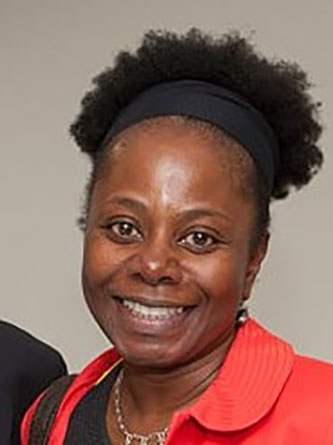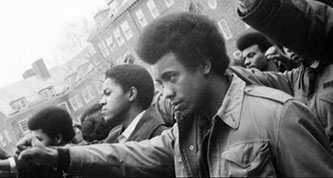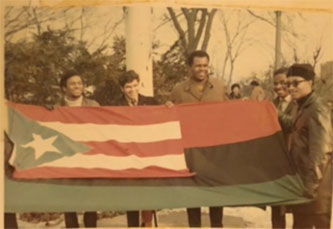BC Spring Conversations Event

Africana Studies Professor, Dale Byam
Since its inception in 2019, the School of Humanities and Social Sciences B.C. Conversations series was designed to connect the campus community to an event that would feature a dialogue between a Brooklyn College professor whose research interests are in line with those of a public facing scholar activist. This year, on February 18, HSS convened its third B.C. Conversations event, "The Struggle for Inclusion at Brooklyn College, 1968–1969," featuring three former student leaders, Askia Davis, Orlando Pile, and Antonio Nieves, who were instrumental in bringing about structural changes at Brooklyn College 50 years ago.
This event was organized by Africana Studies Associate Professor and Director of the Caribbean Studies Program Dale Byam. The conversation was a key element of Byam's Mellon Transfer Student Research project (MTSRP) entitled Who Set The Fires? Interrogating the 1969 Student Protests at Brooklyn College (CUNY). Byam engaged the three former student activists in a lively online discussion of their time at Brooklyn College to both help the audience understand these inspiring and groundbreaking events and to anchor her students' research project.
The three speakers explained that they were highly motivated high school students who had always excelled in their work and were active in extracurricular activities. Davis had left rural Georgia as a teenager and migrated to New York City on his own. Soon after arriving in New York, he came upon a copy of The Autobiography of Malcolm X, a book that convinced him of the need to address systemic racial and economic inequalities head on. He enrolled at Brooklyn College at age 17 in February 1968 and shortly after joined the Black Panther Party in Harlem and became the lieutenant of education in the Harlem chapter, a position he held while commuting daily between Harlem and Brooklyn College. Nieves, of Puerto Rican descent, was also a teenage activist, one who was associated with the Communist Party, and both he and Davis lived independently as teenagers. Pile was introduced to community organizing at an early age because his mother was a member of the Ocean-Hill Brownsville independent school board whose formation and decisions led to two years of intermittent strikes and protests in the area. In spite of their strength of character and personal drive, they often faced discrimination in the pursuit of their ambitions, for example, both Pile and Davis reported being discouraged from following their interest in medicine by college faculty.

Members of BLAC at a rally on the campus
These determined young men brought a new level of civic engagement to the black students at Brooklyn once they joined the Brooklyn League of Afro American Collegiates (BLAC) and the Puerto Rican Alliance (PRA). Nieves served as the liaison between the PRA and BLAC. He and Davis attended a Black Panther conference in Oakland California in 1969, where the delegation learned about developing black studies programs on college campuses. They noted that it was with the guidance of the Black Panther conference organizers that they drafted the 18 demands that they presented to the college, and that led to the eventual formation of the Black and Puerto Rican Studies programs at Brooklyn College. During those years they also championed the push for open admissions at CUNY through various forms of protest on campus. The Brooklyn College activism and protests occurred in the context of national demonstrations opposing the ongoing war in Vietnam, the draft and army recruitment on college campuses, as well as local struggles, protests, and strikes surrounding the decentralization of schools in Ocean Hill-Brownsville. The students' actions at that time drew support from the Students for a Democratic Society (SDS), a national student activist organization that occasionally visited the Brooklyn College campus to show their support for BLAC and PRA. Indeed, their gatherings comprised diverse groups who protested a range of issues that were the subject of heated debate at that time.
After months of demonstrations, sit-ins and disruptions, the college ultimately singled out 19 black and Latino students who were arrested, charged with arson, and jailed at Rikers Island. With the help of Shirley Chisholm, they were released on $15,000 bail four days later. These acts of resistance had great implications for the future of CUNY in general and Brooklyn College in particular. The protests on the campus that led to student sit-ins, the arrest and imprisonment of student activists, and ultimately, the creation of the departments of Africana Studies and Puerto Rican and Latino Studies were part of a multi-campus, CUNY student movement to address historical racial inequities at the university. Davis, Nieves, and Pile's dedication and commitment to equity and inclusion, as well as that of hundreds of other students and many faculty members, ultimately led to the open admissions policy, Black and Puerto Rican Studies and numerous other changes that shaped the composition and character of the City University of New York, pushing it to better reflect its mission of excellence and access.

Members of BLAC and PRA displaying their flags
Nieves went on to the Howard University School of Pharmacy and has been a pharmacist for 30 years and a volunteer for the Caribbean Health Organization in Jamaica for 15 years. He is an amateur photographer and uses his photography to chronicle the stories of the struggle. Pile went on to receive his medical degree from the College of Medicine & Dentistry of New Jersey-Rutgers. He is a specialist in the research on and treatment for communicable diseases, and he has lectured extensively throughout the United States, Jamaica, South Africa, and Malawi, on HIV/AIDS. Davis would become senior assistant to three consecutive chancellors of the New York City Public Schools. He noted that a spirit of community service has marked his personal and professional outlook since his days at Brooklyn College and has inspired his work in educational policy and school leadership.
Byam's MTSRP team project of which the "Struggle for Inclusion" panel discussion was a part, is grounded in the theoretical framework of Theater for Development (T.f.D.) and aims to broadly connect the groundbreaking struggle for inclusion 50 years ago, to current struggles for diversity and equity. In general, T.f.D is an educational participatory strategy that encourages the interrogation of a specific problem through the medium of theater. Students in the three-stage project will collect oral histories and review other documents, plan a performance, and then present their work-in-progress performances of short scripts, poetry, and interactive media. The students will incorporate post-performance small-group talk-back sessions that aim to move the ideas from the stage into the community.
Though T.f.D usually tackles health and social problems in developing countries, Byam notes that the project at Brooklyn College is classified as a T.f.D. project "because Brooklyn College continues to struggle with the issues and identify strategies for authentic inclusion." As Byam remarked, "These strategies underscore the necessity of understanding the relevance of historical events and the need for continued actions to establish equity." The School of Humanities and Social Sciences is proud that its Conversations series is linked to this important approach to inclusion, equity, and social change and is delighted to support it.






